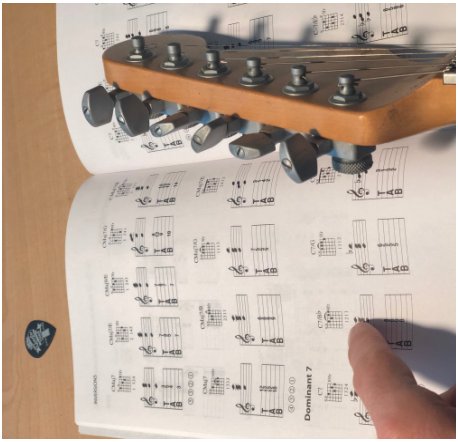Building Your Working Chord Vocabulary


Whether you want to strum some chords by the camp fire, accompany a singer, or play great solos (yes, even lead guitar players need to know chords), building your working chord vocabulary is something all guitar players should be actively practicing.
Working vs Theoretical Knowledge
Iím sure you realize that understanding a chord or memorizing what it looks like doesnít get the job done. You need to be able to play it reliably and consistently. And you need to be able to play it when you need it. Just because you can play a chord in the practice room does not mean you truly know it. Working vocabulary means very literally the chords that you can name and play on your guitar at a momentís notice.
Theoretical vocabulary is all of the chords that youíve learned but you either donít fully understand them or cannot reliably play them when you need them. If you are working on some form of a D chord but your 3rd finger is always late, itís theoretical. If you learned a fancy chord in some song, but donít know the name of it or how to use it anywhere else other than in this exact part of this exact song, it is theoretical. If you know how to build 7th chords and inversions and upper structures but canít execute them in time when comping, these chords are in your theoretical vocabulary.
Bridge the Gap
The ideal situation is to have a very tiny gap in the number of chords in your working vocabulary vs your theoretical vocabulary. To have zero chords in your theoretical vocabulary would mean that you are no longer actively working on expanding your chord vocab, and this isnít recommended either.
From Theoretical to Working To get a chord from theoretical to working, you have to use it. This may sound obvious, but many students donít realize that you can substitute one chord for another. So as you learn power chords and barre chords, play songs you already know. For one rep, play it with 1st position chords, then with power chords, then with barre chords.
If you just learned a Cmaj7 chord for example, play a song you already know and see what it sounds like to replace one of the old C chords with this new one. Many times this substitution will sound just fine; occasionally it will sound even better; and sometimes it wonít sound right at all. But the very act of deciding to play this chord and moving your hands in the moment will strengthen your memory.
From Working to Theoretical
There is a two-way street between these. It is worth your time to take a working chord and create new theoretical ones. A chord you are already using effortlessly come become the template for new chords.
Spend time analyzing chords and knowing where chord tones are within the chord - Root, 3 or b3, 5, 7 or b7, etc. Iíd highly recommend getting some blank chord charts and writing out chords you know, but instead of writing circles, use numbers (the chord tones, not finger numbers).
If you donít know how to do this, a qualified guitar instructor can help you. In the meantime, put some effort into learning the letters names of each fret on your guitarís fretboard. As your chord knowledge expands, you should be able to make a major chord into a minor chord by lowering the ď3Ē by 1 fret. Or a diminished chord by lowering the ď3Ē and the ď5Ē. Or an augmented chord by raising the ď5Ē.

If you are a lead guitarist, you can start to play these new chord shapes as arpeggios over chord progressions and eventually melt some faces.
Donít forget to put what youíve been working on into practice and donít be afraid to make a mistake! You canít improve if you never try.
About the Author
Eric Dieter is a professional guitarist and guitar teacher in Lancaster, PA. He has appeared on dozens of international albums as a session guitar player and tours with the synth-pop and prog-rock band. Eric has studied guitar at Millersville University and Berklee College of Music. Additionally, he holds a degree in psychology and a certification in hypnosis, making him uniquely qualified to train the minds and hands of aspiring musicians. Contact Eric if you are looking for guitar lessons in Lancaster, PA.